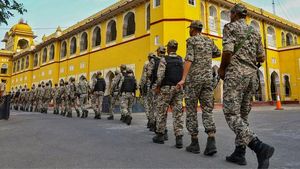In a significant military operation, the Indian armed forces executed Operation Sindoor on May 7, 2025, targeting the heart of terrorism in Pakistan. This decisive action was a direct response to the tragic terrorist attack in Pahalgam, Jammu and Kashmir, which occurred on April 22, 2025, resulting in the deaths of 26 tourists. The attack was claimed by The Resistance Front (TRF), a group linked to notorious terrorist organizations including Lashkar-e-Taiba and Jaish-e-Mohammed (JeM), the latter led by the infamous Masood Azhar.
Operation Sindoor aimed to settle the score for the heinous acts committed by Azhar and his affiliates. The primary target of this operation was the Markaz Subhan Allah, the headquarters of Jaish-e-Mohammed located in Bahawalpur, Pakistan. This location has long been a significant base for planning and executing terrorist activities against India.
Masood Azhar, born in Bahawalpur in 1968, is not just a terrorist but the founder and leader of Jaish-e-Mohammed. His rise to infamy began after his release in 1999, following the hijacking of Indian Airlines flight IC-814, an event that has had lasting repercussions for India. After his release, Azhar orchestrated numerous terrorist attacks, deepening the animosity between India and Pakistan.
Azhar's family, reportedly involved in various terrorist activities, resided in the Bahawalpur area, highlighting the entrenched nature of terrorism in this region. It is believed that all members of his family were implicated in supporting his extremist agenda. The links between Azhar's personal life and his terrorist activities underscore the pervasive influence of his ideology, which has inspired many to join his cause.
The terrorist organization Jaish-e-Mohammed, founded by Azhar in 2000, is notorious for its brutal attacks on Indian soil. The group has been implicated in several high-profile incidents, including the December 13, 2001, attack on the Indian Parliament, which resulted in the deaths of nine individuals, including security personnel and parliament staff. This attack was a direct assault on India's democratic framework and escalated tensions between the two nations.
In January 2016, Jaish-e-Mohammed struck again, targeting the Pathankot airbase, where seven Indian soldiers lost their lives. This attack raised serious questions about India's military preparedness and the ongoing threat posed by such militant groups.
Perhaps the most devastating attack attributed to Azhar's organization was the February 14, 2019, suicide bombing in Pulwama, Jammu and Kashmir, which killed over 40 CRPF personnel. This incident marked one of the deadliest terrorist attacks in India and prompted a swift military response from the Indian government, resulting in airstrikes on Jaish-e-Mohammed camps in Balakot, Pakistan.
Masood Azhar's influence extends beyond individual attacks; he has played a crucial role in promoting militancy in Jammu and Kashmir, expanding Jaish's network to recruit young fighters and instigate violence. His organization has conducted multiple assaults on security forces, including the Jammu and Kashmir Legislative Assembly in 2001, which resulted in 38 deaths, and several attacks on Border Security Force (BSF) camps.
The repercussions of Azhar's actions have been felt not only in terms of human loss but also economically. India has incurred significant financial losses due to the need for heightened security measures and the destruction of infrastructure caused by terrorist activities. The fear instilled in the population has also led to social instability, particularly affecting tourism and the local economy in Jammu and Kashmir, a region heavily reliant on these sectors.
Despite the challenges posed by Azhar and his followers, India has taken steps to bolster its international standing against terrorism. In May 2019, India succeeded in getting Masood Azhar designated as a global terrorist by the United Nations, a move that reinforced India's commitment to combating terrorism on a global scale.
Operation Sindoor represents a critical moment in India's ongoing battle against terrorism, showcasing the country's resolve to confront threats head-on. By targeting the very foundation of Jaish-e-Mohammed, India aims to dismantle the operational capabilities of one of its most dangerous adversaries. The operation not only serves as a message to terrorists but also reassures the Indian public of the government's commitment to their safety and security.
As the dust settles from this operation, the broader implications for regional security and the fight against terrorism remain to be seen. However, one thing is clear: India is prepared to take decisive action against those who threaten its sovereignty and peace.




